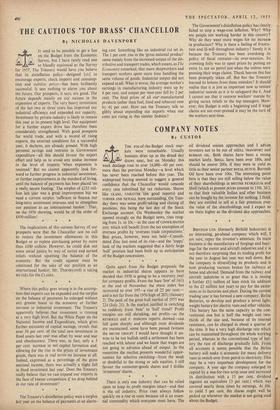COMPANY NOTES
By CUSTOS THE eve-of-the-Budget stock mar- kets were remarkable. Usually
• •".. business dries up as the dread day draws near, but on Monday this week dealings rose to over 16,000-60 per cent. more than the previous Monday—a level which has never been reached before this year. The widespread buying seemed to suggest a general confidence that the Chancellor would concede every case submitted for tax reduction. Shares like GLAXO, UNILEVER (on good reports) and TURNER AND NE WALL were outstanding. On Tues- day there was some profit-taking and closing of positions, this being the last day of the Stock Exchange account. On Wednesday the market opened strongly on the Budget news, rises rang- ing from ls. to 10s.—in the case of CONSOLIDATED ZINC which will benefit from the tax exemption of overseas profits by `overseas trade corporations.' Best prices, however, were not held—Consoli- dated Zinc lost most of its rise—and the `toppy' look of the markets suggested that a fairly large `bull' position had been built up in anticipation of the Budget concessions.
• * *
Quite apart from the Budget proposals the market in industrial shares appears to have decided that 1958 is going to be a recovery year for company profits. From the Suez `low' of 1611 at the end of November the share index has recovered to over 197—a rise of 22 per cent.— and is not far from the 1956 high of 203+ (January 2). The peak of the great bull market of 1955 was 224 (July 21). Is the market justified in switching so suddenly from `bear' to 'bull' trend? Profit margins are still shrinking, net profits—as the REYROLLE and F. PERKINS reports showed—can fall quite sharply and although most dividends are maintained, some have been passed (witness the BRUSH GROUP). I would have thought it un- wise to be too bullish until a settlement has been reached with labour and we know that wages are not going to advance ahead of output. In the meantime the market presents wonderful oppor- tunities for selective switching—from the weak or doubtful to the strong or safe equities. I still favour the consumer-goods shares and I dislike `armament' shares.
* * *
There is only one industry that can be relied upon to keep its profit margins intact—and that is the oil industry. Price rises always follow quickly on a rise in costs because oil is an essen- tial commodity which everyone must have. The oil dividend season approaches and I advise investors not to be out of SHELL TRANSPORT and BURMAH OIL. Both shares have been a strong market lately. SHELL have been over 180s. and should be nearer 200s. if they were to yield as little as their senior partner ROYAL DUTCH. Burmah Oil have been over 106s. The interesting point here is that they are still selling below the value of their shareholdings in BRITISH PETROLEUM and Shell (which at present prices amount to 110s. 3d.), so that their valuable Indian and other business can be bought by the investor for nothing. I think they are entitled to sell at a fair premium over the value of the shareholdings and I expect to see them higher as the dividend day approaches.
* * .* BIRFIELD LTD. (formerly Birfield Industries) is an interesting, go-ahead company which will, I am sure, repay the investor's attention. Its main business is the manufacture of forgings and bear- ings for the motor and aircraft industries and it is not therefore surprising that its trading profit for the year to August last year was well down. But the company is diversifying its products and is now producing vacuum brakes for railways at home and abroad. Demand from the railway and aircraft industries is so great that it is issuing a further £11- million of loan stock (in addition to the £2 million last year) to pay for the exten- sions to its factories and plant. During the current trading year it has formed a new company, Birlite Batteries, to develop and produce a novel light- weight battery for electric vans and other vehicles. This battery has the same capacity as the con- ventional one but is half the weight and two- thirds of the size and, because of its internal resistance, can be charged in about a quarter of the time. It has a very high discharge rate which can be maintained throughout the whole working period, whereas in the conventional type of bat- tery the rate of discharge gradually falls. From all accounts it seems possible that the Birlite battery will make it economic for many delivery vans to switch over from petrol to electricity. This may be a very important development for the company. A year ago the company enlarged its capital by a one-for-two scrip issue and increased its distribution with a 15 per cent. dividend (against an equivalent 13 per cent.) which was covered nearly three times by earnings. At 60s. to yield 5 per cent. the shares might well be picked up whenever the market is not going mad about the Budget.


































 Previous page
Previous page